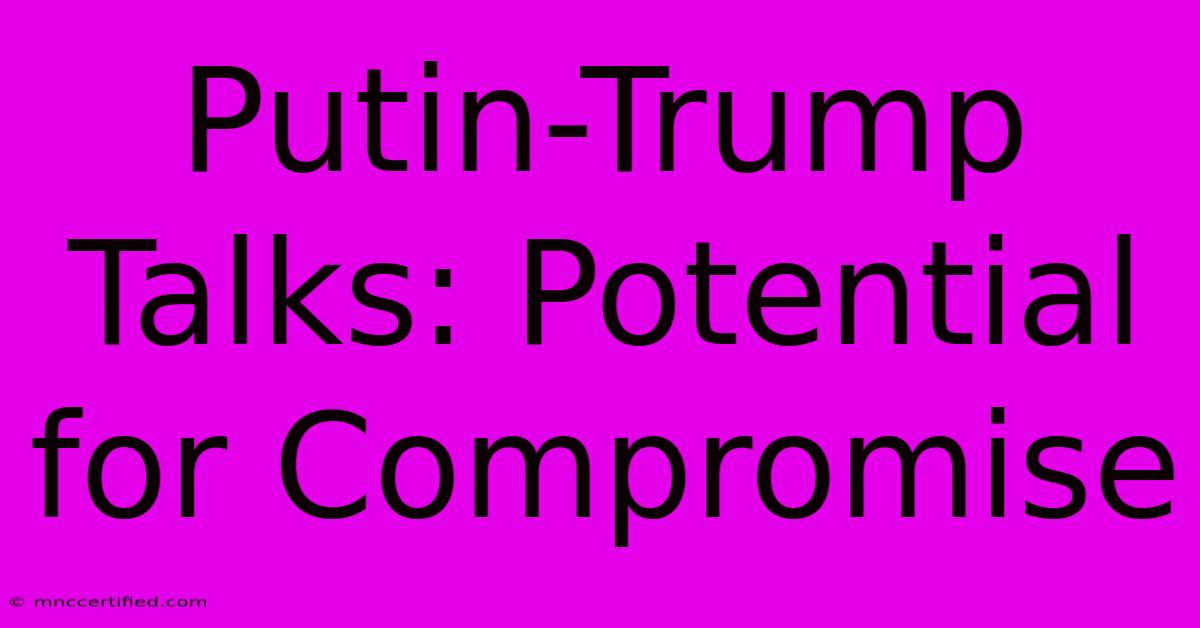Putin-Trump Talks: Potential For Compromise

Table of Contents
Putin-Trump Talks: Potential for Compromise – A Complex Landscape
The prospect of renewed dialogue between Vladimir Putin and Donald Trump, though seemingly improbable given current geopolitical realities, continues to spark debate and analysis. Understanding the potential for compromise requires a nuanced examination of their shared interests, diverging priorities, and the overarching global context. This article delves into the complexities of such a scenario, exploring the potential avenues for cooperation and the significant obstacles that stand in the way.
Areas of Potential Compromise: A Narrow Path
While ideological differences are vast, certain areas could, theoretically, present opportunities for limited compromise between Putin and Trump, or, more realistically, between their respective administrations. These areas are often characterized by overlapping, albeit often self-serving, interests:
1. Arms Control and Nuclear Non-Proliferation:
- Shared Interest: Both leaders have, at different times, expressed concerns about the escalating arms race and the risks of nuclear proliferation. A potential compromise could involve renewed negotiations regarding nuclear arms limitations, perhaps building on the New START treaty or exploring new frameworks.
- Obstacles: Deep mistrust, particularly surrounding accusations of Russian interference in US elections and the ongoing war in Ukraine, severely undermines the foundation for trust necessary for meaningful arms control agreements.
2. Counter-Terrorism Cooperation:
- Shared Interest: Both Russia and the United States share a common enemy in certain terrorist organizations. Cooperation on intelligence sharing and targeted counter-terrorism operations could theoretically be beneficial to both sides.
- Obstacles: Differing definitions of "terrorism," competing regional interests, and the potential for information manipulation create significant hurdles to effective collaboration. Moreover, Russia's relationship with certain actors often considered state-sponsored terrorists adds another layer of complexity.
3. Regional Conflicts (Limited Scope):
- Shared Interest: While often on opposing sides of various conflicts, limited cooperation might be possible in specific regional scenarios where interests partially align. For instance, tackling specific transnational crime syndicates or managing certain aspects of regional instability could, theoretically, create avenues for communication.
- Obstacles: Divergent geopolitical objectives and support for opposing factions in conflicts, notably in Syria and Ukraine, present insurmountable barriers to substantial cooperation.
Significant Obstacles to Compromise: A Steep Climb
Despite the theoretical possibilities, several formidable obstacles stand in the way of any significant compromise between the two sides:
- The Ukraine War: The ongoing invasion of Ukraine represents a fundamental breach of international law and a major point of contention. Any meaningful dialogue would require a significant shift in Russia's position, a highly improbable scenario given Putin's current stance.
- Allegations of Russian Interference: The persistent accusations of Russian interference in US elections cast a long shadow over any potential relationship, fueling deep distrust and hindering any attempts at cooperation.
- Differing Worldviews: The fundamental ideological differences between the two sides – regarding democracy, human rights, and international law – create a wide chasm that is difficult to bridge.
- Domestic Political Pressures: Both Putin and Trump (or their successors) face significant domestic political pressures that may limit their flexibility in negotiating compromises with the other side.
Conclusion: A Remote Possibility?
The potential for compromise between Putin and Trump, or their successors, remains extremely limited. While theoretical areas of potential cooperation exist, the significant obstacles – notably the war in Ukraine and deep mutual distrust – present insurmountable challenges. Any future engagement would require a dramatic shift in the geopolitical landscape, a change in leadership, or a fundamental re-evaluation of national interests by both sides – none of which appear likely in the near future. While limited, specific cooperation on narrow issues might be possible, expecting comprehensive compromise remains unrealistic. The future of US-Russia relations is likely to remain characterized by tension and competition for the foreseeable future.

Thank you for visiting our website wich cover about Putin-Trump Talks: Potential For Compromise. We hope the information provided has been useful to you. Feel free to contact us if you have any questions or need further assistance. See you next time and dont miss to bookmark.
Featured Posts
-
Broncos Vs Chargers Betting Guide Tnf
Dec 20, 2024
-
Manilows Finances In 2024 Revealed
Dec 20, 2024
-
Gb News Reshuffle Dolan Exits Holmes Next
Dec 20, 2024
-
Superman Trailer James Gunns New Film
Dec 20, 2024
-
Confirmed Teams Spurs Vs Manchester United
Dec 20, 2024